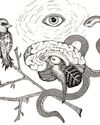
At least sometimes we ought to do what is in our own best interest. However, ethical egoism makes the radical claim that our only duty is to do what is in our own best interest. In other words, we ought to be selfish!
Ethical egoism doesn’t say that we ought to avoid all actions that help others. It says that what makes these actions right, when they are right, is that they are to our benefit. So, if I should help someone else, this is only because doing so would be good for me; and if I should refrain from harming someone, again, that is only because doing so is to my benefit. So, for example, if I find a dropped wallet, then if I am an ethical egoist, I would have good reason to keep it, even if I know to whom it belongs. That person may well be harmed by my action; but that, in itself, is no good reason not to keep the wallet, since I will benefit from keeping it. The same is true of anything else: Help people in poverty? Feed the starving? “Only if there’s something in it for me,” the egoist responds. (Note that the theory says that we should be guided by self-interest, not that we always are.)
This story is from the {{IssueName}} edition of {{MagazineName}}.
Start your 7-day Magzter GOLD free trial to access thousands of curated premium stories, and 9,000+ magazines and newspapers.
Already a subscriber ? Sign In
This story is from the {{IssueName}} edition of {{MagazineName}}.
Start your 7-day Magzter GOLD free trial to access thousands of curated premium stories, and 9,000+ magazines and newspapers.
Already a subscriber? Sign In

Anselm (1033-1109)
Martin Jenkins recalls the being of the creator of the ontological argument.

Is Brillo Box an Illustration?
Thomas E. Wartenberg uses Warhol's work to illustrate his theory of illustration.

Why is Freedom So Important To Us?
John Shand explains why free will is basic to humanity.

The Funnel of Righteousness
Peter Worley tells us how to be right, righter, rightest.

We're as Smart as the Universe Gets
James Miles argues, among other things, that E.T. will be like Kim Kardashian, and that the real threat of advanced AI has been misunderstood.

Managing the Mind
Roger Haines contemplates how we consciously manage our minds.

lain McGilchrist's Naturalized Metaphysics
Rogério Severo looks at the brain to see the world anew.

Love & Metaphysics
Peter Graarup Westergaard explains why love is never just physical, with the aid of Donald Davidson's anomalous monism.

Mary Leaves Her Room
Nigel Hems asks, does Mary see colours differently outside her room?

From Birds To Brains
Jonathan Moens considers whether emergence can explain minds from brains.